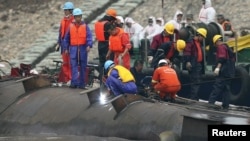Nearly three days after a river cruise ship with hundreds of passengers capsized on China’s Yangtze River, the death toll is mounting and questions remain about what happened that fateful Monday night. Meanwhile, the government is stepping up measures to limit damage to its reputation from what could be the country’s worst maritime disaster in decades.
State media have kept their focus largely on the rescue effort, even as the hope of finding any more survivors has become increasingly slim. Of the 456 people on the Eastern Star, only 14 had been rescued as of Thursday, when the confirmed death toll rose to 75. Most people aboard were tourists over age 60.
Several interviews with some of the survivors have been played and replayed in recent days on state-run television. But little has been said about weather conditions prior to the accident or what the survivors’ thought had happened to the ship.
The official account so far has been that an extreme weather front and tornado was largely to blame for the ship’s capsizing. Little attention has been given to the possibility that human error could have played a role.
Chinese authorities on Thursday morning began trying to right the capsized ship, a measure that may yield answers. The French news agency AFP reported that inclement weather interfered with the operation, but workers were able to weld hooks onto the hull for use in lifting it later.
Questions suppressed
Questions about the ship’s safety record and the captain have been quickly shut down online and on social media.
On the website Freeweibo.com, the Eastern Star was a top-trending censored topic. Some censored posts ranted about the slow pace of the rescue effort. Others wondered how it was that the captain had time to escape, but not enough time to send out a rescue signal.
On the popular WeChat social media service, some stories were censored. One article on the newsfeed of Beijing’s popular Xinjing newspaper that appeared to be a collection of questions was blocked. The title, which was still visible, read: "Things we would like to know about the sinking of the Eastern Star on the Yangtze River. Why was there not any warning for the tornado? Why was the incident not reported to police until two hours after it occurred?"
When clicking on the link, a page pops up claiming it had been removed because of complaints about its content.
China’s Communist Party-backed People’s Daily newspaper has thrown its support behind the ship’s captain, Zhang Shunwen, noting he has 35 years of experience and has been in charge of the ship since 2008. The report also added that Zhang's wife was on board the ship and that her fate is still uncertain.
Investigation promised
Press briefings held by officials have largely worked to reconfirm the official narrative of the incident, giving long lists of numbers of the ships and divers involved in the rescue effort. They have also backed up the theory that a rare but powerful tornado likely caused the ship to capsize.
On Thursday, in an apparent response to protests by family members in Shanghai and at the site of the accident, authorities pledged at a daily briefing to step up efforts to meet the needs of families providing them with lodging near the site and psychological counseling. Officials say that more than 1,200 family members of those on board the ship are in the town of Jianli, where the ship overturned.
Officials have said they will investigate both the captain of the ship and its chief engineer. Transportation Ministry spokesman Xu Chengguang told reporters Thursday that the government would "never shield any mistakes and absolutely not cover up" anything in their investigation.
A preliminary investigation has already begun, officials said. The Communist Party’s Politburo Standing Committee also called for a “serious investigation into the cause of the accident,” according to a Xinhua report.
Trust capsized
But not all were silent. The independent Caixin magazine has published stories about the anger and frustration felt by families of those on board and also raised questions about what happened just moments before the ship capsized.
In a report, released Wednesday, Caixin noted that, according to details from a ship-tracking website, the vessel turned sharply before it capsized. The report quoted analysts who said that it was unlikely a ship as large as the Eastern Star would have changed course due to wind and that the captain may ordered the turn.
The report also noted that with interest in such trips waning and prices for tours sinking lower and lower, the quality of service and maintenance was also declining. The Eastern Star has been in service for more than 20 years and is owned by the Chongqing Eastern Ferry Co., a state-owned enterprise that has been struggling with mounting debt.
Micromanaging questioned
On Chinese social media, prominent journalist Song Zhibiao argued that the government's efforts to micromanage the discussion about the incident has only helped to raise more questions. In the wake of the incident, the Chinese propaganda officials banned local reporters from traveling to the site and ordered local media to only use reports from Xinhua and images from state-run broadcaster CCTV.
In a translation of Song’s posting on the social media site WeChat provided by China Digital Times, he argued that although such heavy-handed management of the media may have worked 10 years ago, it does not work anymore.
While the government may be able to control newspapers, it cannot control social media sites such as Weibo and WeChat, Song said.
"This method of managing information is decayed…. Its air of enforcement is absolutely incapable of bringing about real enforcement and it serves only to inspire reverse psychology and oppositional readings," he said.





